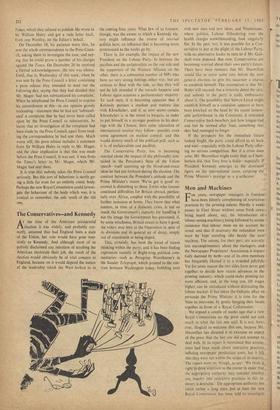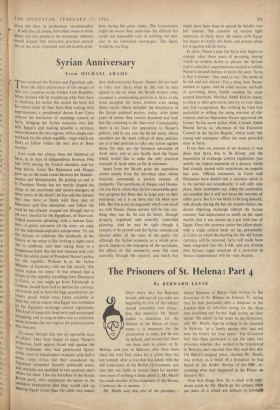Men and Machines
FOR years,. newspaper managers in London,. have been bitterly complaining of restrictive', practices, by the printing tuxions, Hardly a week'. passes in Fleet Street without some fresh story. • being heard .about, say, the introduction of.., labour-saying: machinery being followed by union, insistence that .labour must on no account be.... saved, and that if necessary the redundant men must be kept • standing idle beside the new,!, machine, The unions, for their part, are scarcely.. less uncomplimentary about the managers; and', the Newspaper Proprietors' Association is impar, tially damned by both—one of its own members has frequently likened it to a stranded jellyfish., Yet for sonic reason the two sides have never got- • together to decide how recent advances in the printing industry, which could make printing far more efficient, and, in the long run, lift wages higher, can be introduced without dislocating the labour market. It has taken the Odhams affair to persuade the Prime Minister it is time for the State to intervene, by gently banging their heads, together in front of a Royal Coilimission.
We argued a couple of weeks ago that a new Royal Commission on the press could not add much to what the last one said. It is not, how- ever, illogical to welcome this one, because Mr. Macmillan has directed it to examine an aspect of the press that the last one did not attempt to,, deal. with. In its report it mentioned that accusk lions had been made about restrictive .practices inflating newspaper production costs; but it felt„ that they were not within the scope of its inquiry,. The report went on, though, to say : 'We think 4„ right to draw attention to the matter in order that: the appropriate authority may consider whether any, inquiry into restrictive practices in this in- , dustry is desirable.' The appropriate authority has , taken rather a long time, but at least the new Royal Commission has been told to investigate
along the lines its predecessor recommended.
It will also, of course, haVe other issues to think about; but few people in the newspaper industry would dispute that restrictive practices present One of the most important and intractable prob- lems facing the press today. The Commission might do worse than undertake the difficult but surely not impossible task of working out their cost to an individual newspaper. The figure would be startling.



































 Previous page
Previous page